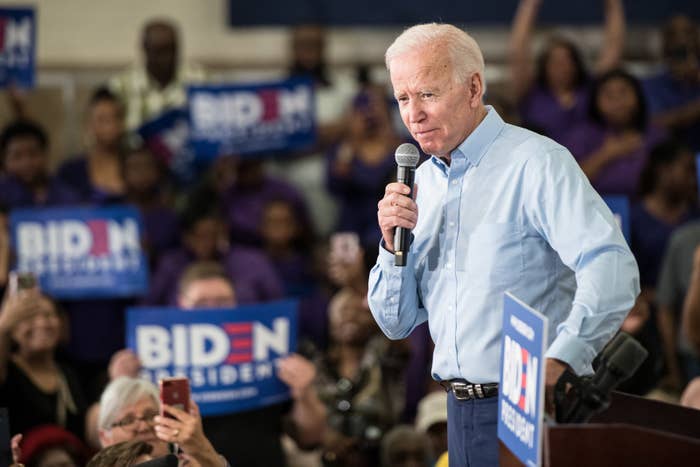
COLUMBIA, South Carolina — Joe Biden, speaking Saturday in a state key to his political survival, and where black people represent the majority of voters in the Democratic presidential primary, invoked the history of voter discrimination and said the country is headed backward.
“Folks,” the former vice president told an audience gathered inside a hot community-center gymnasium, “last year, 24 states introduced or enacted at least 70 bills to curtail the right the vote. And guess what? Mostly directed at people of color. You see it. We have Jim Crow sneaking back in.”
With that throwback to laws that promoted segregation, Biden then reminded the crowd about election results last year in Georgia and Florida, states that elected white Republican governors over black Democrats. Stacey Abrams, who lost the Georgia race but is a rising star in national politics, has met with Biden and has suggested that her defeat was attributable to voter-suppression tactics.
“You know when everybody has an equal right to vote, guess what? They lose,” Biden said of Republicans. “They lose. Folks, it’s just absolutely wrong.”
Biden has framed his presidential campaign partially as a “battle for the soul” of America. The theme plays off the white supremacist riots two years ago in Charlottesville, Virginia, and the response from President Donald Trump, who said there were “very fine people” among those in attendance. The Saturday crowd of about 700 was the most diverse Biden has addressed since entering the presidential race late last month, a fact he accounted for in the additions to what has been his standard stump speech.
The 76-year-old is aware that his history as vice president to the nation’s first black president separates him from his more than 20 rivals for the nomination. Accordingly, he had mentioned Barack Obama everywhere — from Pittsburgh to Dubuque, Iowa — in his first 10 days in the race. Here on Saturday, though, he hit the Obama shoutouts particularly hard.
“My friend,” Biden would say one minute. “My buddy,” the next.
And a few minutes after the Jim Crow remark, when talking about the need to “uplift” communities trapped in poverty and to end “the legacy of systemic racism,” Biden offered an allusion to an old Obama lament: “When two equally qualified people, one Jamal and one John, both apply for a job and John gets the job.”
Biden has long been well regarded in South Carolina, where he was so close to two longtime senators — the segregationist Republican Strom Thurmond and recently deceased Democrat Fritz Hollings — that he eulogized both.
His record on race is being parsed anew post-Obama, however — something of particular note in South Carolina, where black people will likely decide the state’s Democratic primary. Biden’s past opposition to busing as a means of integrating schools and his support for strict crime bills that disproportionately punished people of color are likely to be reexamined in the primary.
“I know he’ll take some heat from some of the legislation that was passed during the Clinton era as it relates to African Americans,” Travis Lincoln, a black voter from Columbia who works with homeless veterans and considers criminal justice reform a key issue, told BuzzFeed News while waiting for Biden’s speech here.
Nonetheless, Lincoln — who is concerned about electability, an even more important issue to many Biden supporters — said the former vice president has his vote in the primary.
“He can’t change what’s happened in the past,” Lincoln said. “He can only look to see what would make it better now, because people make mistakes based on the landscape of what happened at the time. That was a different era. We were going through some things that were not yet seen. The drug epidemic had just reached a high. People were getting incarcerated left and right for things. We didn’t fully understand what was going on. Now we know: You didn’t do that right. … Hopefully he addresses that issue.”

